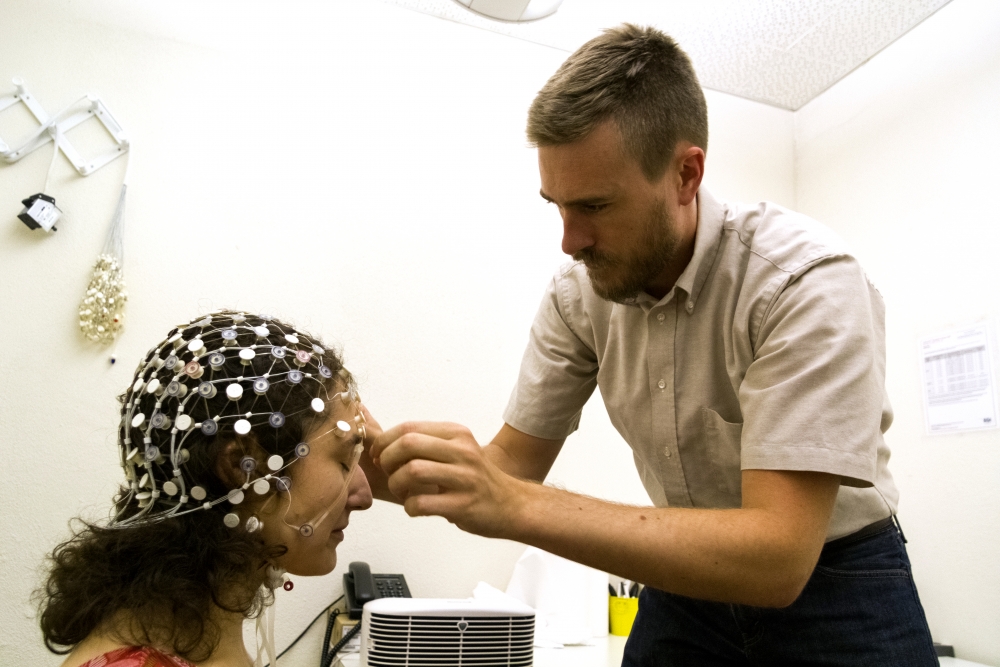Psycholinguistics conducive to AI development

A researcher puts an EEG net on a volunteer for an experiment on how language is organized in the brains of left and right-handed people at the Department of Linguistics, the University of Arizona, on Sept. 16, 2015.
The third International Conference on Psycholinguistics in China, hosted by the Chinese Association of Psycholinguistics (CAP), was held at Nanjing Normal University from Nov. 14 to 15. More than 150 scholars discussed a range of topics, such as bilingualism and its acquisition, language learning and cognitive mechanisms of processing neural psycholinguistics.
Broader research focuses
“In recent years, psycholinguistic research has generated a number of high-quality results and the scope of the study has gone beyond general language cognition, learning and development to further include research on special groups, such as aphasics and autistics, as well as the syntactic and semantic processing of Chinese language,” said CAP President Dong Yanping.
Compared with the US, China has started relatively late in research into special groups, but not in other aspects of psycholinguistics, Dong said, adding that the study of Chinese language appears to be headed in a unique direction.
Technological advances have updated methodologies in psycholinguistic research, allowing the study to expand its focus. The combination of psycholinguistics and brain science has shifted the research from behavioral study to that of neuro mechanisms. It has moved from mental processing to the study of neural issues.
Zhang Hui, a distinguished professor of Nanjing Normal University, said, “Research methodologies in psycholinguistics tend to be more pluralistic at present.”
Traditional psycholinguistics mainly relies on behavioral experiments, Zhang said. However, since the 1980s, an increasing number of researchers have resorted to the event-related potential (ERP) technique and nuclear magnetic resonance to observe human language processing, he noted.
Psycholinguistic research on language processing has been extended to all levels of the language, including meaning, morphemes, words, sentences and texts, Zhang said.
Karsten Steinhauer, a professor from McGill University, said that the application of ERP to studying neurological changes that occur when learning a second language has proven that there was not enough evidence to support the existence of a so-called critical period.
Zhou Changyin, a professor from Beijing International Studies University, said that the ERP technique helped determine the core issues of sentence processing related to the means and interactions of syntactic and semantic processing.
Heading toward integration
Zhang said psycholinguistic researchers in China are scattered across a number of disciplines, including Chinese studies, foreign languages and psychological studies. He said they all have different focuses. For example, linguistic scholars are more concerned about the construction of linguistic theories, while scholars in psychology work more on case studies, but now different disciplines are becoming more integrated, he noted.
Wang Suiping, a professor of psychology at South China Normal University, said: “Language is a complex, high-level activity involving a variety of cognitive processes. No other topic contains such a full display of human wisdom.”
Therefore, Wang said, understanding the patterns of language will to some extent decode the psychological mechanisms behind them. In order to do so, different disciplines and perspectives need to be included in research, she said.
Psycholinguistic theory and methods have been adopted in information transmission and perceptual understanding in communication technology, and aphasia therapy in the medical field, as well as simulations of the human brain in artificial intelligence, Wang said.
“Only through combining abstract theories and practical issues in empirical work can we refine the basic research on traditional linguistics and make contributions to real-life applications, which is why cognitive studies are receiving more and more attention,” Wang noted.
Wu Nan is a reporter at the Chinese Social Sciences Today.
